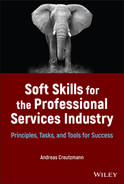Preface
EXPERTISE IS A COMMONLY required prerequisite for professionals. The high requirements for passing the professional examinations document the formal qualification of a lawyer, Certified Public Accountant (CPA), or a Certified Valuation Analyst (CVA). On the way to becoming a lawyer, a CPA, or CVA (and) in their further professional lives, those with specialist knowledge dominate. Inherent in the profession is the willingness for lifelong learning. Qualification and competence are important prerequisites for a successful professional life. This is true not only for auditors and valuation professionals, but also for lawyers, doctors, and other professionals. At the very beginning of my studies, I asked myself a question that still accompanies me today: “Why are some people successful and others not?” I have always been interested in people who are successful through their own efforts instead of building on the success of previous generations through their heritage.
In my search for what distinguishes successful from less successful people, I began to read a variety of relevant books and to attend seminars. These books and seminars dealt with the topics of success, personality development, marketing and sales, rhetoric, psychology, and management as well as self‐management, and personal productivity. To date, I have read several hundred books on these topics and attended an extensive number of seminars.
Most people think of the word success primarily in terms of professional and ultimately financial success. I consider this view of success too one‐sided. A successful life is characterized by both a successful professional life and a successful private life. In a networked world in which everyone can be reached at almost any time from almost any place in the world via smartphone, the boundaries between professional and private life have become blurred. The two areas of life are intricately linked. People who do not have an intact private life will rarely be successful in their careers. If you only seek professional success, you shouldn't be surprised if your private life shows deficits. Through continuously reading books and attending seminars, it quickly became clear to me that the so‐called soft skills of a person are crucial for personal success.
This book summarizes my theoretical and, above all, practical findings on the subject of soft skills from more than 30 years of personal experience. A strict separation between experience drawn from professional or from private life does not seem meaningful to me. The following soft skills apply for the most part to both professional and private life. I wrote this book as an auditor and certified valuation analyst for my professional colleagues. For this reason, the examples and practical advice refer to the profession of auditors and CVAs. In most cases, however, the transfer to other professions is remarkably simple. In this respect, the book is not singularly aimed at auditors, CVAs, and their employees. Even though auditors and valuation professionals are often individualists and tend to see themselves as something quite special precisely because of their high professional qualifications, the following soft skills are predominantly success factors that apply universally.
The individual chapters under the headings Principles of Successful Professionals, Tasks, and Tools can basically be read independently of one another. This means that the individual chapters are self‐contained and, for the most part, do not build on each other. The Introduction, however, “Professionals in a Digital World,” sets the framework and provides valuable information on how to use the book, which is why it should be read prior to all the other chapters.
“Does a successful life also lead to a happy life?” It might seem obvious that a successful life also leads to a happy life. If you read the individual chapters of the book and do not read the Conclusion at the beginning, this final chapter will also provide the answer.
The elephant on the cover impresses with its size and in many cultures also represents the symbol of wisdom, knowledge, and tranquility. This majestic animal is a popular symbol of power and intelligence. In Africa, the elephant is revered as a symbol of happiness and a long life. In China, the elephant embodies ingenuity, energy, and sovereignty. These are the three key words that best symbolize the wholesomeness of the elephant.
- Wisdom
- Steadfastness
- Tradition
In many ways, humans and elephants are similar. The elephant teaches us to give these positive commonalities more space in our own lives. It points us to compassion, sensitivity, and patience, which must be either awakened or preserved in the current phase of our lives. With its help we can more easily absorb knowledge, understand wisdom, and remember the past. The elephant does not only represent wisdom, power, and strength, but also responsibility. Great power is known to bring great responsibility, which is why you can learn leadership from the elephant's qualities – while at the same time being a natural part of the community that respects us. The majestic elephant also stands for happiness, prosperity, and stability.
I hope you enjoy reading the book, and I look forward to your feedback.
